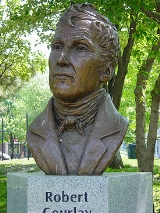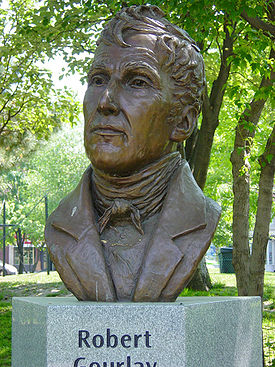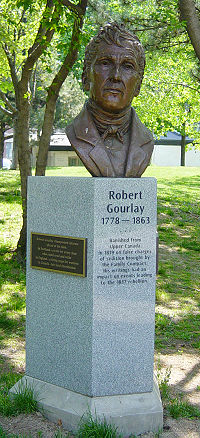
Robert Fleming Gourlay
Encyclopedia
Robert Gourlay was a Scottish-Canadian writer, political reform activist, and agriculturalist.


from the University of St. Andrews and studied agriculture at the University of Edinburgh
. He managed one of his father's farms from 1800 to 1809 and leased a farm from the Duke of Somerset from 1809 to 1817. Gourlay's sympathies lay with the poor farmer, who he saw as being exploited by landlords and the system of government. In 1801, he was employed by the British imperial government to make inquiries into the condition of the British poor. His report prompted a bill to be introduced into the British House of Commons
and adopted, but it was rejected by the House of Lords. In 1809, he published a pamphlet proposing a radical reshaping of the system of government in Britain
. He submitted a proposal to the House of Commons that land be acquired and redistributed to the poor. Gourlay adopted the middle name Fleming in honour of his mother who died in 1827.
In 1817, his wife inherited some land in the Niagara District of Upper Canada
and he travelled there via New York City
, expecting to return by the fall. While there, he decided to gather some statistical information on Upper Canada. This list was based on the questions used by Sir John Sinclair in Scotland, the last question being "What, in your opinion, regards the improvement of your township in particular, or the province in general; and what would most contribute to the same?". This last question came to be viewed with great suspicion by the provincial authorities. The list of questions was sent to all townships in the province.
Gourlay later questioned the decision of Lieutenant Governor Francis Gore
in banning the granting of land to people of the United States
. This ban made it more difficult for landowners in the region to sell their land. Reverend John Strachan
, seeing Gourlay as a trouble-maker, attempted to prevent the return of responses to Gourlay's questions from the townships. In May and June 1818, Gourlay began holding meetings across the province, proposing a direct appeal to the government in England. In the eastern part of the province, he encountered much resistance from the ruling elite, members of the Family Compact
and was assaulted several times. Gourlay was accused of seditious libel
, but was later cleared of these charges. In July 1818, a convention was held at York
with representatives from 14 districts; it was decided to present a petition to the new Lieutenant Governor Sir Peregrine Maitland
. However, Maitland was able to convince the Legislative Assembly
to pass legislation banning seditious meetings and he refused to accept the petition. In December, Isaac Swayze
swore out a complaint against Gourlay under the Sedition Act of 1804, even though this legislation was never intended to apply to British subjects. When Gourlay refused to leave the province, he was jailed. He was later tried and banished to New York
state. It would not be until 1841 that a committee of the Province of Canada chaired by William Tiger Dunlop would hear Gourlay's grievences.
He returned to England and published A General Introduction to a Statistical Account of Upper Canada in 1822. In 1836, the sentence of banishment was annulled, and Gourlay's imprisonment was admitted to have been illegal. In 1842 he petitioned the house for compensation, and was granted a pension of £50 a year, which he declined, as he claimed to be a creditor of the government. He was also the author of numerous pamphlets.
Although Gourlay had been crushed by the colonial authorities, he had helped bring to the surface some concerns about the administration of Upper Canada. He ran unsuccessfully for a seat in the British parliament. Although he can be said to have sowed the seeds of discontent that led to the Upper Canada Rebellion
, he was loyal to Britain and viewed William Lyon Mackenzie
as a traitor. In 1856, he returned to his property in Canada and ran unsuccessfully for a seat in Oxford
in Canada West. He returned to Edinburgh
, Scotland
, and died there in 1863, remaining convinced of the rectitude of his cause to the end.


Biography
Gourlay was born in Scotland in 1778. He received a Master of Arts degreeMaster of Arts (Scotland)
A Master of Arts in Scotland can refer to an undergraduate academic degree in humanities and social sciences awarded by the ancient universities of Scotland – the University of St Andrews, the University of Glasgow, the University of Aberdeen and the University of Edinburgh, while the University of...
from the University of St. Andrews and studied agriculture at the University of Edinburgh
University of Edinburgh
The University of Edinburgh, founded in 1583, is a public research university located in Edinburgh, the capital of Scotland, and a UNESCO World Heritage Site. The university is deeply embedded in the fabric of the city, with many of the buildings in the historic Old Town belonging to the university...
. He managed one of his father's farms from 1800 to 1809 and leased a farm from the Duke of Somerset from 1809 to 1817. Gourlay's sympathies lay with the poor farmer, who he saw as being exploited by landlords and the system of government. In 1801, he was employed by the British imperial government to make inquiries into the condition of the British poor. His report prompted a bill to be introduced into the British House of Commons
British House of Commons
The House of Commons is the lower house of the Parliament of the United Kingdom, which also comprises the Sovereign and the House of Lords . Both Commons and Lords meet in the Palace of Westminster. The Commons is a democratically elected body, consisting of 650 members , who are known as Members...
and adopted, but it was rejected by the House of Lords. In 1809, he published a pamphlet proposing a radical reshaping of the system of government in Britain
Kingdom of Great Britain
The former Kingdom of Great Britain, sometimes described as the 'United Kingdom of Great Britain', That the Two Kingdoms of Scotland and England, shall upon the 1st May next ensuing the date hereof, and forever after, be United into One Kingdom by the Name of GREAT BRITAIN. was a sovereign...
. He submitted a proposal to the House of Commons that land be acquired and redistributed to the poor. Gourlay adopted the middle name Fleming in honour of his mother who died in 1827.
In 1817, his wife inherited some land in the Niagara District of Upper Canada
Upper Canada
The Province of Upper Canada was a political division in British Canada established in 1791 by the British Empire to govern the central third of the lands in British North America and to accommodate Loyalist refugees from the United States of America after the American Revolution...
and he travelled there via New York City
New York City
New York is the most populous city in the United States and the center of the New York Metropolitan Area, one of the most populous metropolitan areas in the world. New York exerts a significant impact upon global commerce, finance, media, art, fashion, research, technology, education, and...
, expecting to return by the fall. While there, he decided to gather some statistical information on Upper Canada. This list was based on the questions used by Sir John Sinclair in Scotland, the last question being "What, in your opinion, regards the improvement of your township in particular, or the province in general; and what would most contribute to the same?". This last question came to be viewed with great suspicion by the provincial authorities. The list of questions was sent to all townships in the province.
Gourlay later questioned the decision of Lieutenant Governor Francis Gore
Francis Gore
Francis Gore, was a British officer and British colonial administrator.Gore was commissioned into the 44th Foot in 1787, but transferred to the 54th Foot in 1794 and the 17th Light Dragoons in 1795. He retired with the rank of major and then became Lieutenant-Governor of Upper Canada from 1806 to...
in banning the granting of land to people of the United States
United States
The United States of America is a federal constitutional republic comprising fifty states and a federal district...
. This ban made it more difficult for landowners in the region to sell their land. Reverend John Strachan
John Strachan
John Strachan was an influential figure in Upper Canada and the first Anglican Bishop of Toronto.-Early life:Strachan was the youngest of six children born to a quarry worker in Aberdeen, Scotland. He graduated from King's College, Aberdeen in 1797...
, seeing Gourlay as a trouble-maker, attempted to prevent the return of responses to Gourlay's questions from the townships. In May and June 1818, Gourlay began holding meetings across the province, proposing a direct appeal to the government in England. In the eastern part of the province, he encountered much resistance from the ruling elite, members of the Family Compact
Family Compact
Fully developed after the War of 1812, the Compact lasted until Upper and Lower Canada were united in 1841. In Lower Canada, its equivalent was the Château Clique. The influence of the Family Compact on the government administration at different levels lasted to the 1880s...
and was assaulted several times. Gourlay was accused of seditious libel
Seditious libel
Seditious libel was a criminal offence under English common law. Sedition is the offence of speaking seditious words with seditious intent: if the statement is in writing or some other permanent form it is seditious libel...
, but was later cleared of these charges. In July 1818, a convention was held at York
Toronto
Toronto is the provincial capital of Ontario and the largest city in Canada. It is located in Southern Ontario on the northwestern shore of Lake Ontario. A relatively modern city, Toronto's history dates back to the late-18th century, when its land was first purchased by the British monarchy from...
with representatives from 14 districts; it was decided to present a petition to the new Lieutenant Governor Sir Peregrine Maitland
Peregrine Maitland
Sir Peregrine Maitland, KCB, GCB was a British soldier and colonial administrator who played first-class cricket from 1798 to 1808....
. However, Maitland was able to convince the Legislative Assembly
Legislative Assembly of Upper Canada
The Legislative Assembly of Upper Canada was created by the Constitutional Act of 1791. It was the elected legislature for the province of Upper Canada and functioned as the province's lower house in the Parliament of Upper Canada...
to pass legislation banning seditious meetings and he refused to accept the petition. In December, Isaac Swayze
Isaac Swayze
Isaac Swayze was a soldier and political figure in Upper Canada.He was born in Morris County, New Jersey in 1751 into a family of German immigrants of Jewish extraction...
swore out a complaint against Gourlay under the Sedition Act of 1804, even though this legislation was never intended to apply to British subjects. When Gourlay refused to leave the province, he was jailed. He was later tried and banished to New York
New York
New York is a state in the Northeastern region of the United States. It is the nation's third most populous state. New York is bordered by New Jersey and Pennsylvania to the south, and by Connecticut, Massachusetts and Vermont to the east...
state. It would not be until 1841 that a committee of the Province of Canada chaired by William Tiger Dunlop would hear Gourlay's grievences.
He returned to England and published A General Introduction to a Statistical Account of Upper Canada in 1822. In 1836, the sentence of banishment was annulled, and Gourlay's imprisonment was admitted to have been illegal. In 1842 he petitioned the house for compensation, and was granted a pension of £50 a year, which he declined, as he claimed to be a creditor of the government. He was also the author of numerous pamphlets.
Although Gourlay had been crushed by the colonial authorities, he had helped bring to the surface some concerns about the administration of Upper Canada. He ran unsuccessfully for a seat in the British parliament. Although he can be said to have sowed the seeds of discontent that led to the Upper Canada Rebellion
Upper Canada Rebellion
The Upper Canada Rebellion was, along with the Lower Canada Rebellion in Lower Canada, a rebellion against the British colonial government in 1837 and 1838. Collectively they are also known as the Rebellions of 1837.-Issues:...
, he was loyal to Britain and viewed William Lyon Mackenzie
William Lyon Mackenzie
William Lyon Mackenzie was a Scottish born American and Canadian journalist, politician, and rebellion leader. He served as the first mayor of Toronto, Upper Canada and was an important leader during the 1837 Upper Canada Rebellion.-Background and early years in Scotland, 1795–1820:Mackenzie was...
as a traitor. In 1856, he returned to his property in Canada and ran unsuccessfully for a seat in Oxford
Oxford County, Ontario
Oxford County is a regional municipality and census division of the Canadian province of Ontario, located in the Southern portion of the province. The regional seat is in Woodstock...
in Canada West. He returned to Edinburgh
Edinburgh
Edinburgh is the capital city of Scotland, the second largest city in Scotland, and the eighth most populous in the United Kingdom. The City of Edinburgh Council governs one of Scotland's 32 local government council areas. The council area includes urban Edinburgh and a rural area...
, Scotland
Scotland
Scotland is a country that is part of the United Kingdom. Occupying the northern third of the island of Great Britain, it shares a border with England to the south and is bounded by the North Sea to the east, the Atlantic Ocean to the north and west, and the North Channel and Irish Sea to the...
, and died there in 1863, remaining convinced of the rectitude of his cause to the end.

